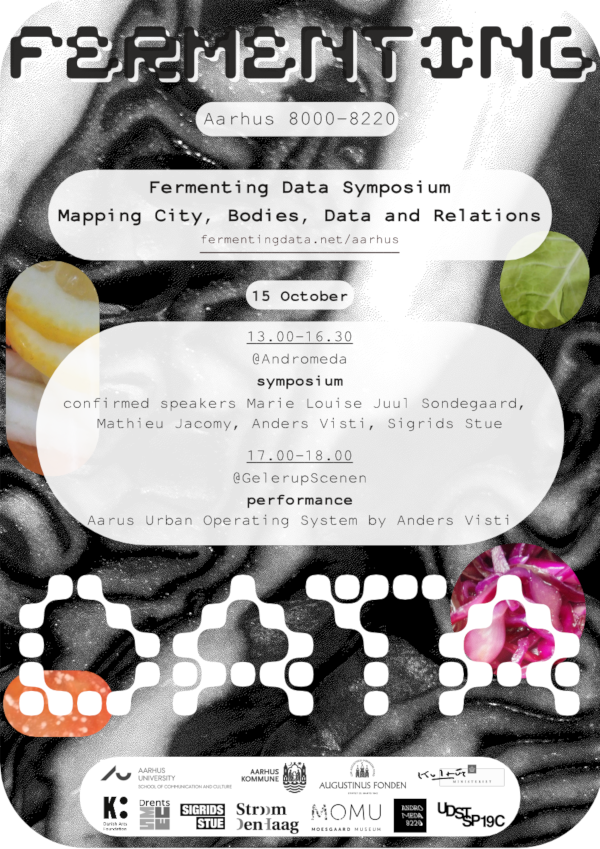blog
Fermenting Data: Mapping City, Bodies, Data and Relations Symposium 15 October

Maps are representational objects. They are created to give a view of a geographical territory while at the same time they naturalize a certain way of looking at the world. Traditionally, maps model spatial organization of an area, which is then written onto a piece of paper following certain rules of cartographic representation. Today such processes are still about a map but they include a range of different practices from collecting and visualisation of data to interaction design and other forms of data modeling.
This event is dedicated to exploration of mapping as diverse processes of tracing affective relations between things, people, and other phenomena including environment. Introducing projects that draw their methods from art, design and data science, the invited speakers will present their different methods of mapping and their different subjects/objects. Here, attention is on the process and its representational vision that captures relations not just spatially but includes different formats and measuring techniques.
This is a free event but registration is required here
Location: Andromeda8220, Gudrunsvej 78, 8220 Aarhus Programme: 13.15-13.30 welcome and introductions Magdalena Tyżlik-Carver and Aysha Amin
13.30-13.55 Anders Visti: Aarhus Urban Operating System + Q&A
13.55-14.20 Marie Louise Juul Sondergaard Fabulating on Menstrual Care with Sphagnum Moss + Q&A
14.20-14.45 Mathieu Jacomy: Repurposing Wikipedia to map collective, implicit relations: the things of life + Q&A
14.45-15.05 break
15.05-15.45 Sigrids Stue presentation + Q&A
15.45-16.20 Round table discussion + plenary with audience and finish (chaired by Søren Bro Pold)
16.20-17.00 Break and drinks
17.00-18.00 performance by Anders Visti at Gellerup art factory (5 mins walk from Andromeda)
Speakers Biographies
Aysha Amin is an artist, activist and the co-manager of Andromeda - a gallery and artist platform in Gellerup, Aarhus. Born and raised in Gellerup – a district currently subject to the largest transformation of its kind in a European context - Aysha is the first generation to experience the political, societal and structural implications of a tremendous changing landscape - physical and mental.
Mathieu Jacomy is Doctor of Techno-Anthropology and post-doc at the Aalborg University TANT Lab. He was a research engineer for 10 years at the Sciences Po médialab in Paris, and is a co-founder of Gephi, a popular network visualization tool. He develops digital instruments involving data visualization and network analysis for the social science and humanities. His current research focuses on visual network analysis, digital methods and issue mapping. He contributes to developing the web crawler Hyphe, the online network sharing platform MiniVan, and Gephi. He tweets at @jacomyma and blogs at [reticular.hypotheses.org] (https://reticular.hypotheses.org/).
Søren Bro Pold is PhD and Associate Professor of digital aesthetics. He has published on digital and media aesthetics – from the 19th-century panorama to the interface in its various forms, e.g. on electronic literature, net art, software art, creative software, urban interfaces and digital culture. He has been active in establishing interface criticism as a research perspective, which discusses the role and the development of the interface for art, aesthetics, culture and IT.
Søren Pold’s interests cover digital aesthetics broadly, including electronic literature, net art, software art, urban art and activism, and he has participated in founding several of these fields since the mid-1990s. Simultaneously, he has been dedicated to establishing digital aesthetics as a perspective in other IT research fields such as design, HCI, informatics and Internet research.
Sigrids Stue is an art project and a platform based in the neighbourhood Gellerup, Aarhus, Denmark. Among Sigrids Stude many activities are projects developed in cooperation with both local, national and international partners and artists, Drawing School, and outdoor workshop for children in the district. Sigrids Stue is located on the 3rd floor apartment and in a 2 stock container house with an inviting outdoor area. We also have a kitchen garden in the area – all located in the very center of Gellerup.
Marie Louise Juul Søndergaard (she/her) is a feminist, interaction designer, and postdoctoral researcher at The Oslo School of Architecture and Design, Norway. She explores speculative design of intimate technologies for human menstrual care and sexual health. Her recent practice engages with the materiality of the human body and its entanglement with socio-technical-environmental ecologies. She has a PhD in interaction design from Aarhus University, Denmark, and has been a postdoc at KTH Royal Institute of Technology, Sweden. Website: [www.mljuul.com] (https://mljuul.com/)
Magdalena Tyżlik-Carver is Associate Professor in the Department of Digital Design and Information Studies at the School of Communication and Culture at Aarhus University. In her research and curatorial projects she explores relational arrangements of humans and nonhumans and their biopolitical creations through posthuman curating and curating in/as common/s, future thinking, affective data and data fictions. Her recently curated exhibitions and events include Fermenting Data project and exhibition in Aarhus (2021), ScreenShots: Desire and Automated Image (2019), Movement Code Notation (2018), Corrupting Data (2017), Ghost Factory: performative exhibition with humans and machines (2015) and Common Practice (2010, 2013). [thecommonpractice.org] (https://thecommonpractice.org/)
Anders Visti is an artist working with code. Founder and co-editor of the publishing house * [asterisk] from 2002-12. Founder and editor of the printed web publication ‡ DobbeltDagger and initiator of Code&Share[ ] and !=null, two public forums for artists, researchers, developers and hackers using contemporary technology for creative expression and aesthetic inquiry. [andersvisti.dk] (https://andersvisti.dk/)
Tags: blog, symposium, research, data